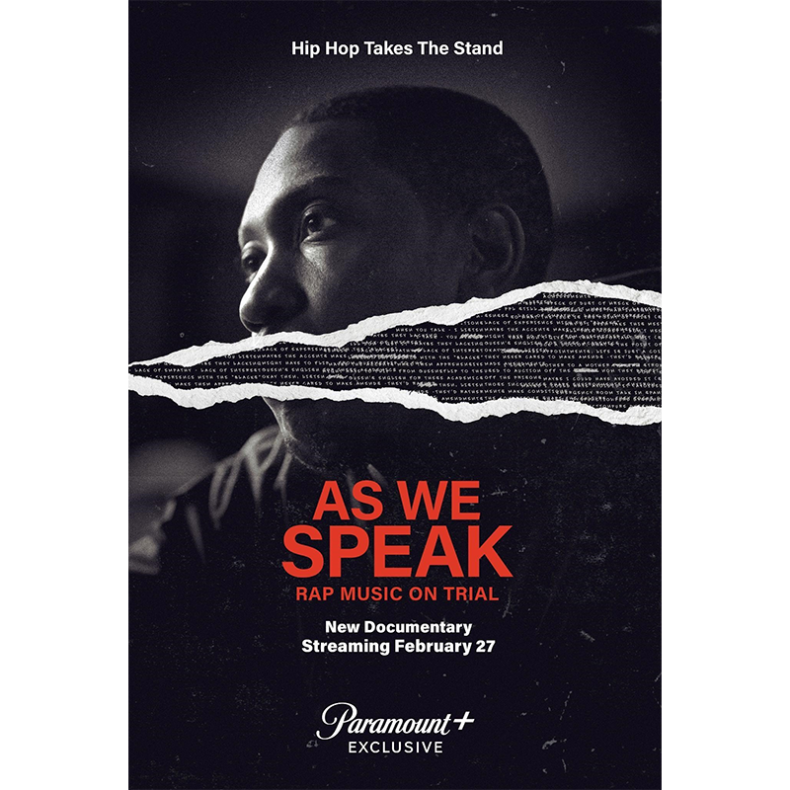AS WE SPEAK: RAP MUSIC ON TRIAL
MTV ENTERTAINMENT STUDIOS/DISTRICT 33/PARK PICTURES/STRIKE ANYWHERE
FEBRUARY 27, 2024
Hip-hop and the law collide on As We Speak: Rap Music On Trail, a documentary that follows Bronx rapper Kemba as he explores how the United States Justice Department has used lyrics as means of evidence in criminal cases. Alongside director J. M. Harper (Jeen-yuhs: A Kanye Trilogy, Don’t Go Tellin’ Your Momma), Kemba examines a continued legacy of systemic oppression in a significant manner. While the doc has made its streaming debut via Paramount+, the film has been celebrated at various film festivals, garnering awards and nominations at Sundance, SXSW, Cannes, and the EMMY’s since 2021.
As We Speak is a highly ambitious film. Immediately, Kemba and Harper widen their scope looking at the importance of music, not only to artists but to African American culture. They explore music as an opportunity that can lead to economic emancipation within a society of oppression that presents little other means of social movement. Within the same breath, they examine different means of attempted censorship from the Negro Act, which outlawed drums on slave plantations, to branding jazz as the devil’s music, and the attempts from the Parents Music Resource Center (PMRC) to make the sales of violent and profane music illegal from the. Through this, Kemba and Harper have expertly exposed a heritage of cultural oppression.
With the stage set, Kemba and Harper seek the legal guidance from an array of lawyers, professors, and activists, as they clearly outline how district attorneys and prosecutors have normalized the use of lyrics as evidence as a means of incarcerating and policing artists. With the addition of interviews featuring the likes of Killer Mike, Mac Phipps, Glasses Malone and Axl Beats, among others, Kemba and Harper examine this issue in a broad sense, making strong use of both primary and secondary evidence. Furthermore, these interviews subtly humanize the rappers as they discuss their dreams, aspirations, and fears. Through this, they not only examine high profile cases, such as that of Drakeo The Ruler’s 2018 murder trial – in which the late rapper was acquitted – but also the rise of drill, a subgenre of rap that came to prominence in the last decade, especially in both Chicago and London, to great effect.
Amid the scholarly and firsthand interviews, As We Speak flaunts a powerful degree of artistic merit. Two moments in particular stand out as highlights among a very strong documentary. The first stems from a meaningful connection between William Shakespeare and hip-hop. This culminates with a moving re-enactment of Act 3, scene 1 of Romeo And Juliet in a bar, resulting in the murder of Tybalt. The second follows shortly after, capturing the performance of a community gospel choir as a partial list of all the drill rappers who’ve died in the last decade floods the screen. It is overwhelming. This is where As We Speak shines; it will leave you uncomfortable and angry. These moments will evoke emotions, challenging you to decolonize your perception.
At its core, As We Speak highlights a series of constitutional hypocrisies and human rights violations. The censorship of art and lyrics as an issue of free speech, however, this has specifically been weaponized as a means of policing, prosecuting, and persecuting African Americans. Through this, Kemba and Harper further examine additional compounding issues from social, legal, and economic inequities, along with a culture of intergenerational hatred and systemic oppression targeted at communities of colour. As We Speak is an effective documentary that examines the cultural significance and power of hip-hop alongside illuminating just one form in which racism plays in the African American struggle for survival, equal citizenship, and dignity today. As We Speak: Rap Music On Trail is both a celebration of hip-hop and an attack on systemic oppression, making it an incredibly important film.










